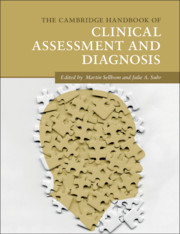Book contents
- The Cambridge Handbook of Clinical Assessment and Diagnosis
- The Cambridge Handbook of Clinical Assessment and Diagnosis
- Copyright page
- Contents
- Figures
- Tables
- Contributors
- Acknowledgments
- 1 Introduction to the Handbook of Clinical Assessment and Diagnosis
- Part I General Issues in Clinical Assessment and Diagnosis
- Part II Specific Clinical Assessment Methods
- 10 Clinical Interviewing
- 11 Multi-Informant Assessment of Psychopathology from Preschool through Old Age
- 12 Intellectual Assessment
- 13 Achievement Assessment
- 14 Using Vocational Assessment Tests
- 15 Neuropsychological Testing and Assessment
- 16 Minnesota Multiphasic Personality Inventory-2-Restructured Form (MMPI-2-RF)
- 17 Personality Assessment Inventory
- 18 The Millon Clinical Multiaxial Inventory-IV (MCMI-IV)
- 19 Self-Report Scales for Common Mental Disorders
- 20 Performance-Based Techniques
- Part III Assessment and Diagnosis of Specific Mental Disorders
- Part IV Clinical Assessment in Specific Settings
- Index
- References
17 - Personality Assessment Inventory
from Part II - Specific Clinical Assessment Methods
Published online by Cambridge University Press: 06 December 2019
- The Cambridge Handbook of Clinical Assessment and Diagnosis
- The Cambridge Handbook of Clinical Assessment and Diagnosis
- Copyright page
- Contents
- Figures
- Tables
- Contributors
- Acknowledgments
- 1 Introduction to the Handbook of Clinical Assessment and Diagnosis
- Part I General Issues in Clinical Assessment and Diagnosis
- Part II Specific Clinical Assessment Methods
- 10 Clinical Interviewing
- 11 Multi-Informant Assessment of Psychopathology from Preschool through Old Age
- 12 Intellectual Assessment
- 13 Achievement Assessment
- 14 Using Vocational Assessment Tests
- 15 Neuropsychological Testing and Assessment
- 16 Minnesota Multiphasic Personality Inventory-2-Restructured Form (MMPI-2-RF)
- 17 Personality Assessment Inventory
- 18 The Millon Clinical Multiaxial Inventory-IV (MCMI-IV)
- 19 Self-Report Scales for Common Mental Disorders
- 20 Performance-Based Techniques
- Part III Assessment and Diagnosis of Specific Mental Disorders
- Part IV Clinical Assessment in Specific Settings
- Index
- References
Summary
The Personality Assessment Inventory (PAI; Morey, 1991) is a 344-item self-administered questionnaire that assesses a variety of psychopathology and personality domains. The PAI consists of twenty-two non-overlapping scales, including four validity scales, eleven clinical scales, five treatment scales, and two interpersonal scales. Ten of the scales are further organized into subscales intended to assure breadth of coverage within diagnostic constructs. PAI scale and subscale raw scores are linearly transformed to T-scores (mean of 50, standard deviation of 10) to provide interpretation relative to a community standardization sample. Each item on the PAI is rated using a four-alternative scale, ranging from False, Not at all True (F), to Very True (VT). The PAI has practical applications across a variety of assessment specialties, including diagnostic decision-making, treatment planning, forensic evaluation, and personnel selection.
Keywords
- Type
- Chapter
- Information
- The Cambridge Handbook of Clinical Assessment and Diagnosis , pp. 231 - 248Publisher: Cambridge University PressPrint publication year: 2019
References
- 3
- Cited by

